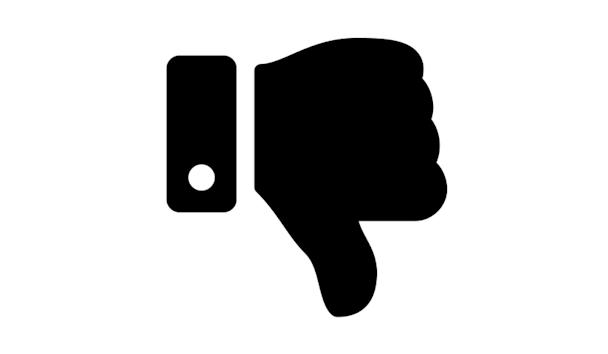Your brand experience needs to be more than just flight of fancy
The road to bad brand experience is paved with good intentions. Ben Ireland of Unlimited explains how to make good on the promises you set out to deliver.

Customers are prone to ditch a brand after a negative experience / Wikimedia commons
We’ve all been there. You see a social post about a product you’re interested in. You click through to view it… and land on a generic homepage. You try to search for the product but don’t quite know its name.
A little scrolling through various similar options and there it is. But the product page is a little… underwhelming. You have a question about the item, which sends you on a wild goose chase involving FAQs, a charmless chatbot, and maybe even a disappointing phone interaction thrown in to boot.
That’s the brand experience, right there.
Explore frequently asked questions
Customers are hard won and easily lost
Forget that flashy, expensive brand book that was launched to a fanfare of buzzwords in a series of presentations to various teams across several countries. What your customers see is this disjointed, frustrating, generic journey. All that work on brand differentiation sadly didn't become a reality.
And what’s the impact of this? According to Forbes, 87% of customers who say they had a great brand experience will make another purchase from a company, compared to 18% of customers who had a very poor experience. PwC surveyed 15,000 consumers and found that one in three customers will leave a brand they love after just one bad experience, while 92% would completely abandon a company after two or three negative interactions.
But it’s not all about purchases. Not to be morbid, but no one’s hoping for a repeat purchase on a funeral. But what more important a time is there to meet expectations, remove friction, and make the experience as seamless and customer-centric as possible? The point is, no matter what your sector or who your customers are, delivering on your brand promise is paramount.
In our work with a well-known automotive brand, aligning car-dealer website behavior with the brand site experience, we saw a 35% increase in test drive bookings – their primary conversion driver. Similarly, working with an in-home care business, we saw dramatic growth through aligning customer experience in home and apps with partner experience for GPs and local authorities, and employee experience for carers administering care. This alignment delivered a seamless, consistent experience for the brand, making it attractive to investors, customers, and the workforce. It’s no surprise that this company has grown from a start-up to being the UK’s largest in-home care provider. So, the value of ‘getting it right’ is clear.
Advertisement
How to get it right
The brands that get it right are easy to spot: Apple, Nike, Innocent. Big companies, with lots of resources. And budget. The good news? It’s often simpler to align your brand experience in smaller, more nimble businesses.
But also, if we believe that your people and products are your brand, then we need to consider those internal experiences that employees have. At all levels.
Then there are partners, suppliers, and investors. Secondary, tertiary, and quaternary audiences, all of whom we have interactions with. Having delivered brand experience for many small, medium, and international brands, we know that identifying all touchpoints, internal and external, is essential. Otherwise, you’re not practicing what you preach. All of this sounds complex, and it is, but let’s pull out a few key steps:
Defining your brand at a detailed level is key. Tone of voice, values, mission, and brand strategy should all be inputs, but these are directive, not executional. Determining a set of behavioral principles is also important. This is where your values become, well… behaviors. Brand personality isn’t so much what you say, as what you do, so behaviors really are key.
Testing the principles comes next. Now we can start to think about how to apply these principles to your channels, customers, and missions. This phase of stress-testing, consideration, and iteration is critical. It’s harder to re-position your brand after a bad approach than it is to test it and be sure. Then, deploy this across your audience touchpoints. Internal, external, web, apps, stores, call centers, internal platforms, employee training… you get the idea.
Advertisement
Lastly, get measuring. You’ll want to measure brand sentiment, net promoter score (NPS), Customer Satisfaction Index (CSI), or whatever metric you align with, but generally the more insight and understanding, the better. And now? You’re actually delivering on those brand promises made way back in the rose-tinted days of creating your brand book.
Obviously, we’ve simplified this description of our process for the sake of a) brevity, b) sanity, but the gist is, brand experience is an achievable goal with massive upsides. Studies suggest that 45% of a brand’s image can be attributed to what it says and how it says it. And also, that 54% of people don’t trust brands. It’s hard to gain trust, and easy to lose it, so the sooner you align your brand experience, the more effective the brand will become.
It doesn’t all have to be delivered at once. As long as you’re focusing on the most impactful areas first. And have a roadmap for the rest. Because no one likes that wild goose chase feeling.
Suggested newsletters for you
Content by The Drum Network member:

UNLIMITED
UNLIMITED delivers business impact through human understanding. We’re an integrated tech-enabled agency group comprised of TMW, Walnut, Health Unlimited and Nelson...
Find out more